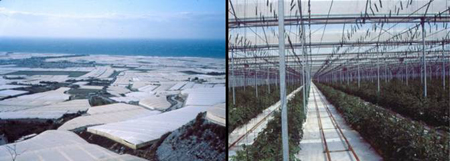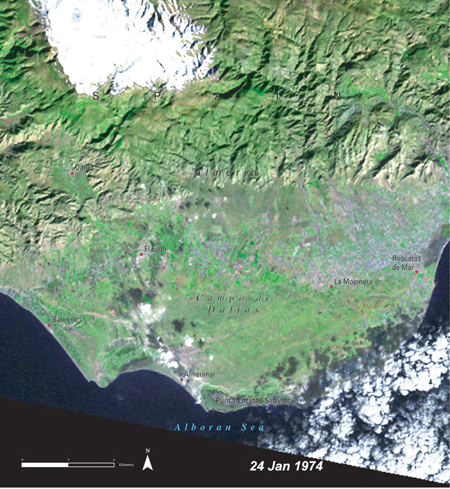3. Syndromes of Global Change
Conservatories
Almeria's Green Houses
Tasks:
1. Describe the changes in the cultivation region Almeria using the text and the satellite images.
2. Name the advantages and disadvantages of production under plastic plans.
3. Discuss the consequences of this cultivation culture for the region and for Europe.
Today, regardless of the season, one can find fresh fruit and vegetables in every super market in Middle and North Europe. A large portion of these products come from Spain. The most important fruit- and vegetable cultivation region for "us" is the Southern Spanish province Almeria with its many green houses. Here, under a large sea of plastic, about 30,000ha (3 million tonnes) of fruit and vegetables are produced for the European market.
In the hot and dry climate of Almeria the rashly flourishing (and often family owned) green house agriculture develops (left image). Tomatoes are cultivated in Hydroponics (plants are grown in a liquid fertiliser and substrate instead of from the ground) in glass or plastic houses (right image).

Source: UNEP
The agriculture began in this extremely dry region in the middle (40's) of the last century. It has, in the mean time developed into Europe's most intense agricultural habitat. The reason being the long insolation, which allows up to five harvests a year, even in months in which other South European countries cannot harvest anything. Through the cultivation under plastic film the water consumption can be reduced by one third. At the same time, the high temperatures help raise output. Today the harvests per hectare are almost four times those from 30 years ago.
The major reason for the erratic development of agriculture in the region is primarily the change in eating patterns in the North European countries. The population wants to buy fresh fruit and vegetables in every season. The result of this production, especially of the early vegetables, depends mainly on the ability of the producer to, for a short period of time, mobilise a large amount of cheap workers (UNEP, umbruch-bildarchiv.de).
